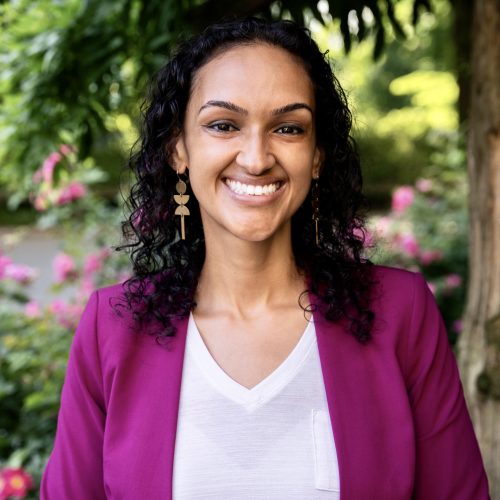Dr. Gladys Yacely Aponte (she/her) is a fieldwork advisor and course instructor in the Dual Language/Bilingual and TESOL programs at Bank Street College. Gladys has been teaching at Bank Street since she graduated from the College’s Dual Language Bilingual Childhood Special Education program in 2013. She is a former New York City public school dual language bilingual teacher who is committed to language justice and strength-focused approaches to bilingualism. Gladys is currently a Postdoctoral Research Scholar at the Children’s Equity Project, Arizona State University, where she has co-authored a number of policy and research briefs related to dual language bilingual education.
Educational Background
Qualifications
MSEd Dual Language/Bilingual Childhood Special Education, Bank Street College of Education; PhD, Urban Education, The Graduate Center-City University of New York
Publications
Aponte, G. Y. (2024). Teaching in the “home language” is not enough: Navigating Spanish raciolinguistic ideologies in a dual language bilingual program. [Doctoral dissertation, The Graduate Center, City University of New York]. CUNY Academic Works. https://academicworks.cuny.edu/gc_etds/5599/
Soto-Boykin, X., Meek, S. Williams, C., Aponte, G., Espinosa, L., Montes, G., Garcia, E., Oliva-Olson, C., Castro, D., Robert, M., Gadaire, D., Franco-Jenkins, X., Figueras-Daniel, A., Fyfe, B., Edyburn, K., Pontier, R., Tagawa, D., Garcia, E., Palomino, C., Alexander, B. (2024). Operationalizing High-Quality Dual Language Programming: From the Early Years to the Early Grades. The Children’s Equity Project. https://cep.asu.edu/resources/Operationalizing-High-Quality-Dual-Language-Programs
Espinet, I., Sánchez, M. T., & Aponte, G. Y. (2021). Creating translanguaging inquiry spaces in bilingual classrooms. In E. Erling, J. Clegg, C. M. Rubagumya, & C. Reilly (Eds.), Multilingual learning and language supportive pedagogies in Sub-Saharan Africa (pp. 175-192). Routledge.
Juarez Mendoza, A.N., & Aponte, G.Y. (2021). Coastal Reflections: A Plática on Embodied Knowledge and Schooling Wounds. In Fowler, T.A., & Allen, W.S. (Eds.), Duoethnographic Encounters (pp. 83-94). DIO Press, New York.
Aponte, G.Y., Espinet, I., & Seltzer, K. (2020). Fostering Bilingual Reading Identities in Dual Language Bilingual Classrooms. In CUNY-NYSIEB (Eds.), Translanguaging and transformative teaching for emergent bilingual students: Lessons from the CUNY-NYSIEB project (pp. 115-130). New York: Routledge.
Espinet, I., Aponte, G. Y., Sánchez, M. T., Figueroa, D. C. & Busone-Rodríguez, A. (2020). Interrogating language ideologies in the primary grades: A community language inquiry unit. In The CUNY-NYSIEB Team (eds.). Translanguaging and transformative teaching for emergent bilingual students: Lessons from the CUNY-NYSIEB project (pp. 219-238). Routledge.
García, O., Aponte, G.Y., & Le, K., (2020). Primary bilingual classrooms: Translations and translanguaging. In Laviosa, S., & González Davies, M. (Eds.). The Routledge handbook of translation and education, p.81-94. Taylor and Francis.
Martin, K.M., Aponte, G.Y., & García, O. (2020). Countering raciolinguistic ideologies: The role of translanguaging in educating bilingual children. Cahiers internationaux de sociolinguistique, 16(2), 19-41. doi:10.3917/cisl.1902.0019.
Seltzer, K., Ascenzi-Moreno, L., & Aponte, G.Y. (2020). Translanguaging and Early Childhood Education in the USA: Insights from the CUNY-NYSIEB Project. In J. A. Panagiotopoulou, L. Rosen, & J. Strzykala (Eds.), Inclusion, Education and Translanguaging: Inklusion und Bildung in Migrationsgesellschaften. (pp. 23–39). Wiesbaden,VS: Springer.
Solorza, C., Aponte, G.Y., Becker, T., Leverenz, T., & Frias, B. (2019). Translanguaging in Dual Language Bilingual Education: A blueprint for planning units of study: A CUNY-NYSIEB Guide. New York, NY: City University of New York–New York State Initiative on Emergent Bilinguals (CUNY-NYSIEB), The Graduate Center.
Aponte, G. Y. (2018). Centering the marginalized identities of immigrant students of color in the literacy classroom. Texas Education Review, 6(2), 90-97.
